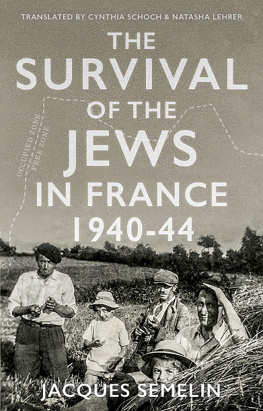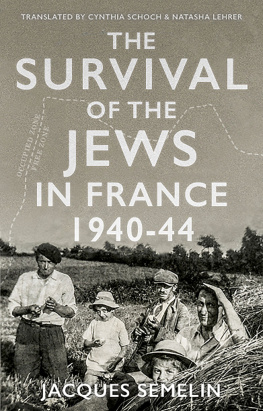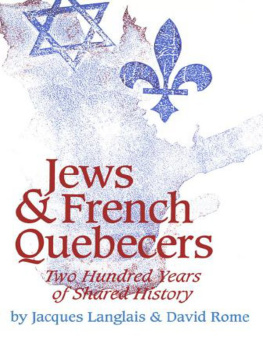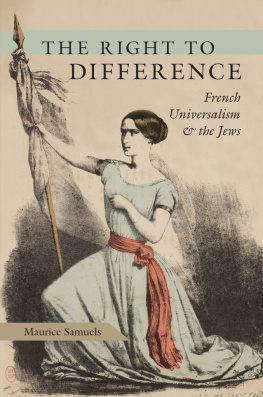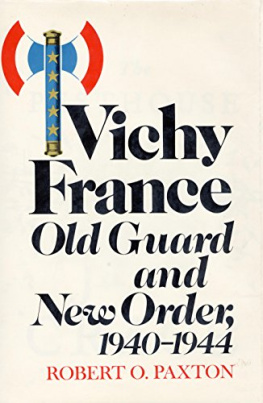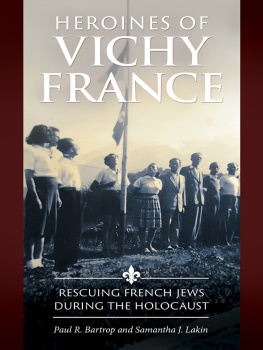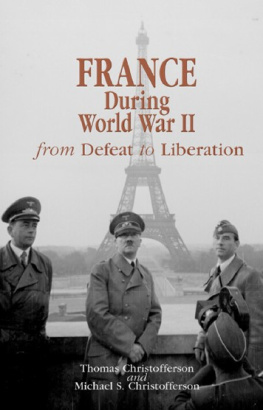THE SURVIVAL OF THE JEWS IN FRANCE
COMPARATIVE POLITICS AND INTERNATIONAL STUDIES SERIES
Series editors, Christophe Jaffrelot and Alain Dieckhoff Series managing editor, Miriam Perier
The series consists of original manuscripts and translations of noteworthy manuscripts and publications in the social sciences emanating from the foremost French researchers.
The focus of the series is the transformation of politics and society by transnational and domestic factorsglobalisation, migration and religion. States are more permeable to external influence than ever before and this phenomenon is accelerating processes of social and political change the world over. In seeking to understand and interpret these transformations, this series gives priority to social trends from below as much as to the interventions of state and nonstate actors.
JACQUES SEMELIN
The Survival of the Jews in France
194044
Translated by
CYNTHIA SCHOCH and NATASHA LEHRER


Oxford University Press is a department of the University of Oxford. It furthers the Universitys objective of excellence in research, scholarship, and education by publishing worldwide. Oxford is a registered trade mark of Oxford University Press in the UK and certain other countries.
Published in the United States of America by Oxford University Press 198 Madison Avenue, New York, NY 10016, United States of America.
Jacques Semelin 2018
All rights reserved. No part of this publication may be reproduced, stored in a retrieval system, or transmitted, in any form or by any means, without the prior permission in writing of Oxford University Press, or as expressly permitted by law, by license, or under terms agreed with the appropriate reproduction rights organization. Inquiries concerning reproduction outside the scope of the above should be sent to the Rights Department, Oxford University Press, at the address above.
You must not circulate this work in any other form and you must impose this same condition on any acquirer.
Library of Congress Cataloging-in-Publication Data
Names: Jacques Semelin.
Title: The Survival of the Jews in France, 1940-44 / Jacques Semelin.
ISBN 9780190057992
In memory of Simone Veil, who deeply encouraged my research, and Stanley Hoffmann, who strongly supported it.
For Serge Klarsfeld, whose life and work have been a constant inspiration.
CONTENTS
by Serge Klarsfeld
This work was made possible thanks to the support of the Foundation for the Memory of the Shoah, which enabled Clotilde Meyer to abridge the original text, published in 2013 with the title Perscutions et entraides dans la France occupe (Seuil-Les Arnes, 904pp). Clotilde Meyer used her intelligence, tact, and skill to do the impossible: drastically reduce the length of a text, while preserving the central narrative thread. Working with the author, she completed an exceptional job of cutting and stitching, using her talent to condense the work. I owe her my profound thanks.
My deep gratitude also goes to Michael Dwyer, the publisher at Hurst, for believing in this new book, the third of my works to be released by his publishing house.
I am extremely grateful to Miriam Perier, editorial manager of publications at CERI Sciences Po, not only for her dynamism in putting together applications for the various grants to finance the translation, but also for her cheerful coordination with the publisher.
I furthermore warmly thank Cynthia Schoch and Natasha Lehrer for their exceptional work as translators of this book, the subject of which is so sensitive. I was very confident of this achievement since Cynthia had already done a wonderful job translating my earlier book Purify and Destroy (2007).
And I do not want to forget Lara Weisweiller-Wu, managing editor for this manuscript at Hurst, who has been very responsive and efficient in overseeing the whole process to bring this book to fruition.
The English translation received funding from the Centre National du Livre, the Foundation for the Memory of the Shoah, the Fondation du Judasme Franais and the Direction de la Mmoire et des Archives (Ministre des Armes), to which I also owe my thanks.
The preparation of this abridged version was an occasion to rework some of my ideas, taking into account various responses to the original edition. I owe a debt of gratitude to my colleague Laurent Joly for the time that he took to read my work, in particular the introduction and the conclusion, which were entirely rewritten.
During the years I spent researching the book, I benefited from the advice of several historians and specialists of the period, with whom I corresponded regarding various issues. I must particularly thank Claire Andrieu, Patrick Cabanel, Bernard Delpal, Jean-Marc Dreyfus, Laurent Douzou, Jeannine Levana Frenk, Philippe Joutard, Serge Klarsfeld, Michel Laffitte, Philippe Landau, Lucien Lazare, and Annette Wieviorka.
At the Centre de Documentation Juive Contemporaine in Paris, Karen Taeb went out of her way to help me consult files and testimonies (in particular the 967 and the Latour archives).
I could not have been welcomed with more generosity at the multimedia center at the Shoah Memorial in Paris. My thanks to all those who were particularly helpful when it came to exploring the hidden children archives.
Philippe Allouche (Foundation for the Memory of the Shoah) and Dominique Missika from the National Audiovisual Institute helped me obtain the transcripts of a number of interviews undertaken between 2005 and 2006 as part of the FMS-INA series.
In July 2009, I visited the US Holocaust Museum in Washington, DC to consult a number of different archives dealing with France.
In Jerusalem, Jeannine Levana Frenk was enormously generous with her time and knowledge, and made a number of files dating from between 2000 and 2005 of nominees for the title Righteous of France available to me.
At Sciences Po Paris, Martine Jouneau of the CNRS (Centre national de la recherche scientifique) provided vital help in collecting and verifying data relating to synagogues and religious locales from before 1940, as well as data about Jews during the Occupation. Her meticulous work in the Consistory archives and the National Archives made it possible to put together the previously unpublished maps that appear in . The maps were drawn by Dorian Ryser, also from Sciences Po, to whom I also owe thanks.
I also benefited from the assistance of doctoral students from EHESS and Sciences Po, whose help when it came to consulting archives, articles, and books has been invaluable: thank you to Laura Hobson Faure, Samuel Ghiles-Meilhac, Lisa Vapn, and Arnaud Siad.
I owe an immense debt to Maureen Attali, a teaching fellow in history, my research assistant from May 2010 to February 2012. Whether it was collating and presenting testimonies, researching in the archives, editing chapters, or putting together the bibliography, her services were absolutely irreplaceable. Her deep interest in the topic meant that she frequently raised pertinent issues that stimulated new ideas and helped with the process of writing. Without her precious help this book would simply not be what it is.

